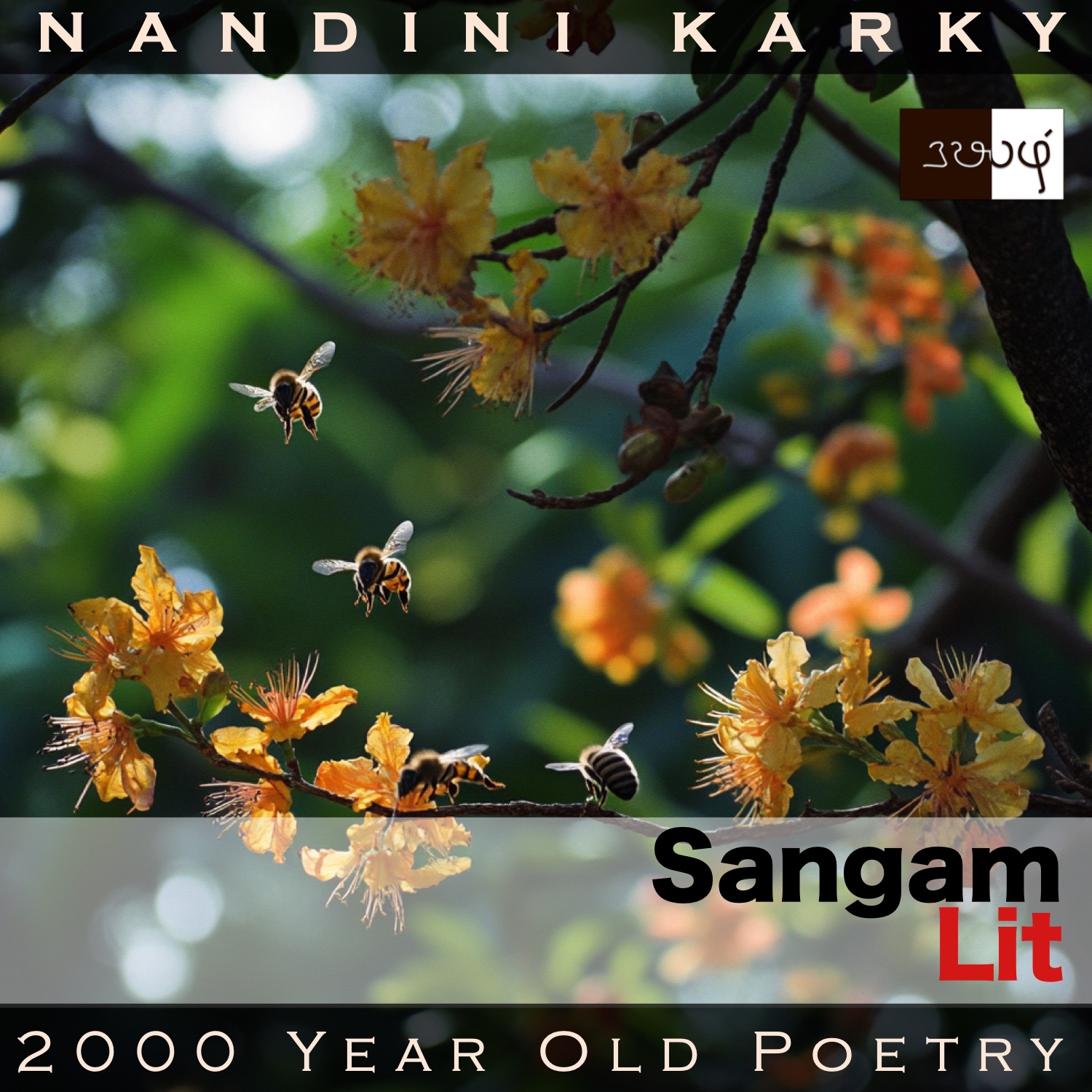Podcast: Play in new window | Download
Subscribe: Apple Podcasts | Spotify | Amazon Music | Android | iHeartRadio | TuneIn | RSS | More
In this episode, we perceive the support rendered by a bard, as depicted in Sangam Literary work, Kalithogai 30, penned by the Chera King Paalai Paadiya Perunkadunko. The verse is situated in the ‘Paalai’ or ‘Drylands landscape’ and sketches the prior acts of the man.

‘அருந்தவம் ஆற்றியார் நுகர்ச்சி போல், அணி கொள
விரிந்து ஆனாச் சினை தொறூஉம், வேண்டும் தாது அமர்ந்து ஆடி,
புரிந்து ஆர்க்கும் வண்டொடு, புலம்பு தீர்ந்து எவ் வாயும்,
இருந் தும்பி, இறை கொள எதிரிய வேனிலான்
துயில் இன்றி யாம் நீந்த, தொழுவை அம் புனல் ஆடி,
மயில் இயலார் மரு உண்டு, மறந்து அமைகுவான்மன்னோ
‘வெயில் ஒளி அறியாத விரி மலர்த் தண் காவில்
குயில் ஆலும் பொழுது’ எனக் கூறுநர் உளராயின்
பானாள் யாம் படர் கூர, பணை எழில் அணை மென் தோள்
மான் நோக்கினவரோடு மறந்து அமைகுவான்மன்னோ
‘ஆனாச் சீர்க் கூடலுள் அரும்பு அவிழ் நறு முல்லை,
தேன் ஆர்க்கும் பொழுது’ எனத் தெளிக்குநர் உளராயின்
உறல் யாம் ஒளி வாட, உயர்ந்தவன் விழவினுள்
விறல் இழையவரோடு விளையாடுவான்மன்னோ
‘பெறல் அரும் பொழுதோடு, பிறங்கு இணர்த் துருத்தி சூழ்ந்து,
அறல் வாரும், வையை’ என்று அறையுநர் உளராயின்’
என ஆங்கு,
தணியா நோய் உழந்து ஆனாத் தகையவள் தகை பெற,
அணி கிளர் நெடுந் திண் தேர் அயர்மதி பணிபு நின்
காமர் கழல் அடி சேரா
நாமம் சால் தெவ்வரின் நடுங்கினள் பெரிதே.
After a long time, we are hearing the voice of a person other than the confidante and the lady and it happens to be a bard! The words can be translated as follows:
“‘With the ever-present joy found in those who have achieved hard penance, blacks bees buzz obtaining their food, relishing pollen plenty that they were yearning for, on flowers that open their petals, adorning all the branches with beauty, delighting in the end of their sorrow. Such is the season of spring that has arrived.
As I tossed without sleep, he played in the lush waters of the river, inhaling scents of those who appear like peacocks, back then. Can he forget that and stay away if some one were to go to him and say, ‘It’s the time when, in the moist grove with fully-bloomed flowers that know not about sunlight, cuckoos sing’?
As suffering spread in me at midnight, he was in the embrace of those who have bamboo-like, delicate arms, and the gaze of a deer, back then. Can he forget that and stay away if some one were to go to him and clarify, ‘It’s the time when, in Koodal of unending fame, around fragrant jasmine buds, bees buzz’?
As I, his wife, faded away, the noble man was playing in the festival with women clad in exquisite jewels, back then. Can he forget that and stay away if some one were to go to him and declare, ‘It’s the time when, in the Vaigai, causing many sand islets, streams gush’?’
Saying these words, with a disease that abates not, she suffers. To render grace to that gracious one, ride on your tall and sturdy chariot, adorned with beauty, for akin to how the foes, who do not bow before your feet, quiver when they hear your name, she shivers in worry tremendously!”
Time to explore the nuances. The verse is situated in the context of the man’s parting from the lady and here, a bard renders the words of the lady and his concluding thoughts to the man, who is to be found in a battle encampment. The bard conveys through the lady’s words that the season of spring was there, wherein bees were in the state of those, who had obtained deep bliss through their penance. The bees were in that state of ‘Nirvana’ because all the branches had bursted with flowers and pollen, the very thing they wanted! Now the lady continues by remembering how when she was lying sleepless the man used to enjoy himself, playing in the waters, inhaling the scents and embracing the bamboo-like arms of courtesans. Now, we get a taste of ‘Marutham’ or ‘Farmlands’ in this verse situated in the drylands. The lady has recollected these events to say that back then, the man was like that, and now if someone were to go and tell him that the cuckoos were singing in moist groves, bees were buzzing in Koodal and streams were flowing making many sand islets in the Vaigai, the man would recollect his joyous times with those maiden and return home instantly. This seems to be a strategy of the lady wherein she declares, ‘Maybe he has forgotten me but he is sure to not have forgotten his dear courtesans!’.
The bard takes these words of the lady to the man and nudges him to ride his chariot and be back with her soon. He concludes with a sharp simile that the lady seems to tremble without the man’s presence akin to how the foes of this noble man do, when they hear his name. The last line informs us the man is in a battlefield, and also, the lady’s words about his affection for courtesans is meant to shock the man and divert his thoughts towards the lady. Thinking tangentially, why should a lady lament for such a man if the statements about his courting courtesans are true? Was her life so irrevocably tied to the presence of the man or is that the narrative the poets wished to depict? If they do, what was the inner motive? Sangam Lit continues to raise questions about these intricate facets of a culture’s intention!




Share your thoughts...